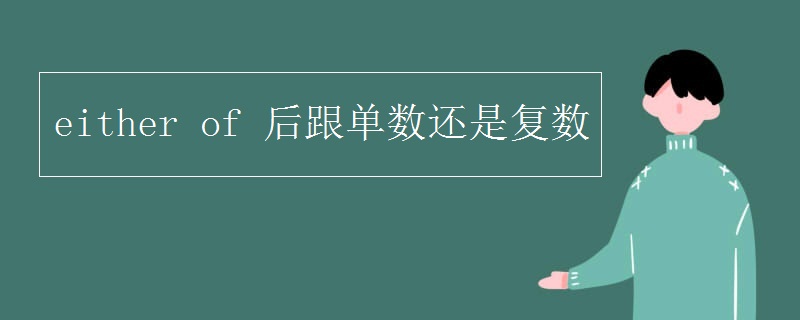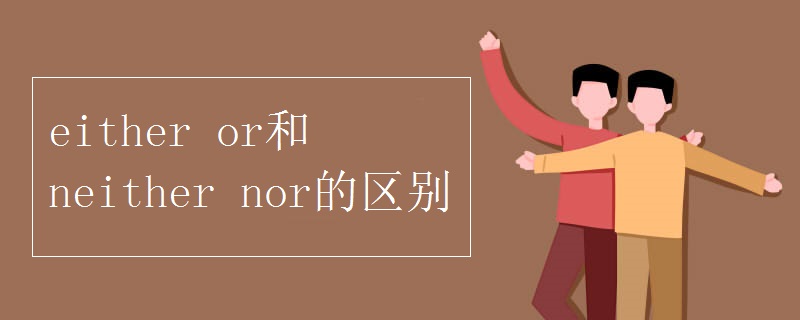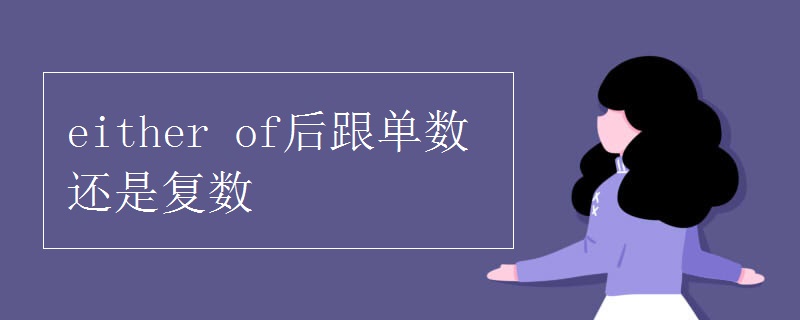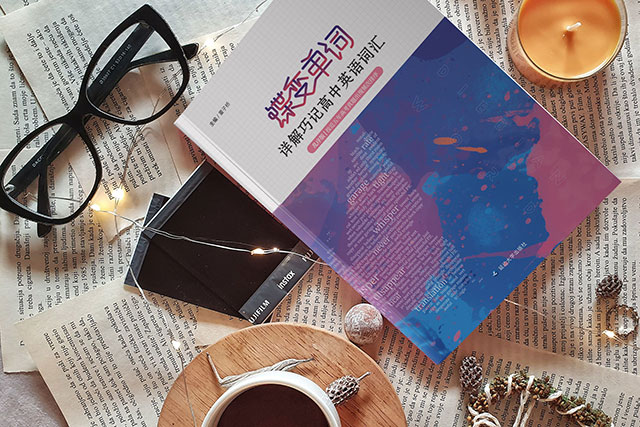either的用法有哪些 和neither的区别是什么
2019-04-07 15:16:45文/叶丹eithe是指任何一个;各方,每一方。either是个常用词,它既可作代词,意为(两者之中)任一、任何一个;也可作副词,用于否定句作“也”解释,通常置于句末。

either的用法是什么
1. either用作代词,意为“(两者之中)任一、任何一个”。在句中可作主语(此时句中谓语动词用单数)、宾语、表语和定语(作定语时,有的词典把它称为形容词;either作定语时,只能修饰单数名词。)如:
Either (of the books) is popular with the students.
(两本书)随便哪一本都受到同学们的欢迎。(主语)
I have bought two cakes you may have either.
我买了两块蛋糕 你要哪块都行。(宾语)
The books were either works on travel or detective novels.
这些书要么是旅游方面的书,要么是侦探小说。(表语)
You can park on either side of the street.
在街道的哪边停车都可以。(定语)
2. either用作副词,用于否定句作“也”解释,通常置于句末。如:
I don”t like the red shirt and I don”t like the green one either.
我不喜欢这件红衬衫,也不喜欢这件绿衬衫。
As for me, I shall not return there either.
如果是我,我也不会回到那儿的。
either还可用来强调含否定意义的短语。如:
I know a good ltalian restaurant. It”s not far from here either.
我知道一家意大利餐馆,离这儿并不远。
3. either可以构成短语,either…or…,意为“或……或……、不是……就是……”,在句中连接两个并列成分。如:Either you or Tom has done it.(连接并列主语)
不是你就是汤姆做了这件事。
You may either stay at home or go there with us.(连接并列谓语)
你既可以待在家里也可以和我们一道去。
注:在连接两个并列主语时,谓语动词必须在人称和数上与靠近的主语保持一致。
4. either的反义词为neither“(两者)都不”,either…or…的反义词组为neither…nor…“既不……也不……”。如:
You can drop either of the two courses.
你可以放弃这两门课程中的任何一门。
You can drop neither of the two courses.
这两门课程中的任何一门都不能放弃。
Either you or he has made the mistake.
不是你就是他犯了这个错误。
Neither you nor he has made the mistake.
犯错误的既不是你也不是他。
either…or…表示两种可能性中任选一种,其后面必须连接两个相同的句子成份。例如:
The sentence can be either true or false.句子要么是对的要么是错的。
You can either come with me or walk home.
你要么跟我一块去,要么走回家去。
Either mum or I cook supper.要么我母亲要么我做晚饭。
neither…nor…连接两个相同的句子成分,表示否定的意思。动词的单复数形式与nor后的单词主谓语相一致。例如:
Neither Li Lei nor Wang Hai was there.李雷和王海都不在那里。
I neither watch TV nor listen to the radio.我既不看电视也不听收音机
too和either、neither的使用方法
肯定句
A: I like pork. 我喜欢猪肉。
B: Me too. / So do I . 我也是。(肯定句)
注:B回答两句都可以使用,但后一句适用于有动词的句子。
A: I am Chinese. 我是中国人。
B:Me too. / So am I . 我也是。(肯定句)
注:B回答两句都可以使用,但后一句适用于有be动词的句子。
综上所述,使用Me too通用,保险(不易出错)。
否定句
A: I don't like lamb. 我不喜欢羊肉。
B: Me either. / Neither do I. 我也不喜欢。(否定句)
注:B回答两句都可以使用,但后一句适用于有动词的否定句。
A: I am not a student. 我不是学生。
B: Me either. / Neither am I. 我也不是。(否定句)
注:B回答两句都可以使用,但后一句适用于有be动词的否定句。
综上所述,使用Me either.通用,保险(不易出错)。
too的其他用法
A:I am French. Are you French,too? 我是法国人。你也是法国人吗?
B:Yes,I am.(肯定回答);No,I am not. (否定回答)
注:I am not =I'm not (缩写)
These pants are too long. 这裤子太长。
You're so beautiful. 你太美了。
这句话中千万不能使用too来形容美丽,通常too都有太过的意思,如果用了too,也就是说你本来不该这么美丽(整容之后才变美的?呵呵!),是不是想要表达的意思反了。
注:you're=you are
either其他用法
A:Do either of you like seafood?(你们俩都喜欢海鲜吗?)
B:Yes,I do.(肯定回答)
C:No,I do not.(否定回答)
注:I do not = I don't
 either of 后跟单数还是复数
either of 后跟单数还是复数either of,“两者之一”,其后谓语动词用单...
2020-02-20 疑问句用too还是either
疑问句用too还是either疑问句用too,either只用于否定句尾,als...
2020-01-09 either or就近原则
either or就近原则either...or...的就近原则:eith...
2019-12-16 either or和neither nor的区别
either or和neither nor的区别either or和neither nor两词都...
2019-12-09 either和too的区别
either和too的区别either和too的区别:too作副词时意为“太...
2019-12-08 either of后跟单数还是复数
either of后跟单数还是复数either of(两者其一),neither o...
2019-11-15 neither和either的用法区别
neither和either的用法区别neither和either都表示“两者…”。ne...
2019-08-01 either的用法有哪些
either的用法有哪些either是兼类词,可以作为副词、形容词、代词和...
2019-05-31 专科工资高的十大专业 哪些专业有前景
专科工资高的十大专业 哪些专业有前景专科工资高的十大专业有哪些,什么专业有前景,小编整...
2021-03-26 美术生大学四年花费多少 贵吗
美术生大学四年花费多少 贵吗美术生大学四年花费多少,贵不贵,小编整理了相关信息...
2021-03-26 高中议论文作文素材摘抄2021
高中议论文作文素材摘抄2021作文教学是语文教学的一个重要模块,而作文素材的积累...
2021-03-26 学美发的最佳年龄 多大学合适
学美发的最佳年龄 多大学合适学美发的最佳年龄,多大学合适,小编整理了相关信息,...
2021-03-26 男性冷门高薪职业有哪些 什么职业挣钱
男性冷门高薪职业有哪些 什么职业挣钱男性冷门高薪职业有哪些,什么职业挣钱,小编整理了相...
2021-03-26 高考英语如何快速提分
高考英语如何快速提分学习任何一门语言,首先要让认识这门语言,英文作为世...
2021-03-26 掌门一对一的价格表 收费情况是什么
掌门一对一的价格表 收费情况是什么掌门一对一高级教师:250-350元/小时,仅供小...
2021-03-26
点击查看 高中英语 更多内容




